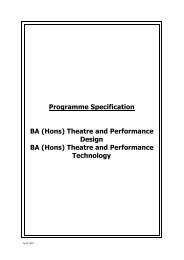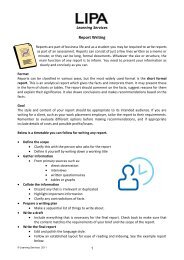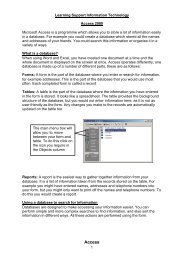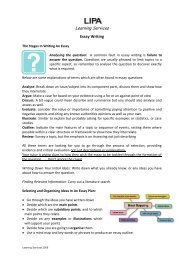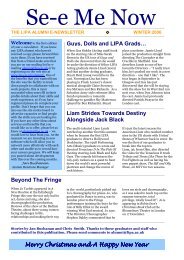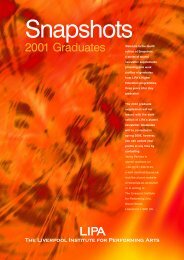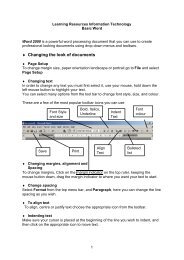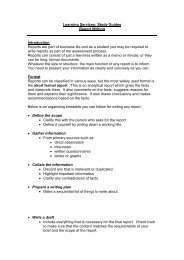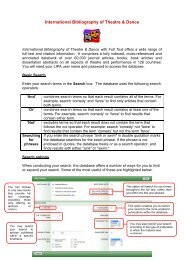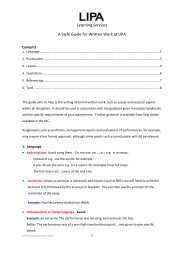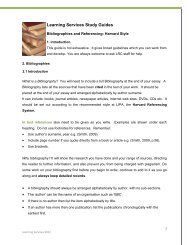Essay Writing
Essay Writing
Essay Writing
You also want an ePaper? Increase the reach of your titles
YUMPU automatically turns print PDFs into web optimized ePapers that Google loves.
Learning Services: Study Guides<br />
<strong>Essay</strong> <strong>Writing</strong><br />
The Stages In <strong>Writing</strong> An <strong>Essay</strong><br />
Analysing the question: A common fault in essay writing is failure to answer<br />
the question. Questions are usually phrased to limit topics to a specific<br />
aspect, so remember to analyse the question to discover exactly what is<br />
required.<br />
<strong>Writing</strong> Down Your Initial Ideas: Write down what you already know, or any<br />
ideas you have about how to answer the question.<br />
Finding Relevant Information: Carry out a literature search. See the guide on<br />
Literature Searching.<br />
Selecting and Organising Ideas In An <strong>Essay</strong> Plan:<br />
• Go through the ideas you have written down<br />
• Decide which are the main points<br />
• Decide which are subsidiary points, and to which main points they<br />
relate<br />
• Decide on any examples or illustrations which will support your<br />
points<br />
• Decide how you are going to organise them.<br />
• Use a mind map and key words or phrases to produce an essay<br />
outline.<br />
<strong>Writing</strong> Your <strong>Essay</strong><br />
Do follow your plan, ensure you order your material in a logical way, make<br />
paragraph divisions significant as these act as crucial “sign-posts” to the<br />
reader.<br />
The Introduction should state how you interpret the question and how you<br />
propose to answer it. Keep it short and to the point. Aim to indicate what will<br />
follow, what your approach will be and what you intend to achieve. Remember<br />
the Introduction creates the initial impression of the whole of your essay!<br />
The Main Body of the essay is the part that gives the facts and arguments<br />
raised by the question with evidence and examples to support them. Ensure<br />
that each paragraph flows smoothly into the other. This can be achieved by<br />
using linking words. (e.g. First, Secondly, As a result, However) Support each<br />
main opinion or statement with evidence, examples, quotations and provide<br />
references to your sources. Avoid simple narration - present the evidence or<br />
primary material, make your comments, draw your conclusion.
The Conclusion draws together the arguments to show the final conclusions<br />
you have reached in answering the question. It should be short, and should<br />
be supported by the discussion in the main body of the essay. Avoid simply<br />
repeating the points made in your introduction.<br />
The Bibliography is a list of information sources you have used for the<br />
essay.<br />
(See separate sheet on Referencing and Bibliographies!)<br />
Pit Falls<br />
• Failing to comprehend the requirements of the question and to structure<br />
the answer accordingly.<br />
• Ignoring vital aspects of the question and wandering into irrelevance.<br />
• Recounting or narrating material in a continuous flow without analysing or<br />
commenting on it.<br />
• Failing to pursue a coherent line of thought and to organise material<br />
logically.<br />
Criteria of good essay writing<br />
• Have you answered the question in the title?<br />
• Have you drawn on relevant and varied sources?<br />
• Do you show a good grasp of the main ideas?<br />
• Have you presented a coherent argument?<br />
• Is it written in an objective analytical style with appropriate use of<br />
evidence?<br />
• Is it well written? (i.e. Easy to read, clear etc.)<br />
© LIPA Learning Services 2001



